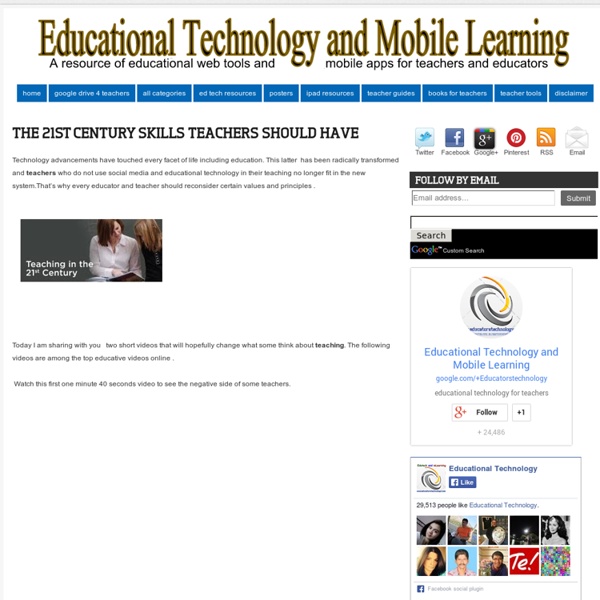The 21st Century Skills Teachers Should Have

PERFIL DE COMPETENCIAS DEL DOCENTE COMO TUTOR EN LÍNEA PARA LA EDUCACIÓN A DISTANCIA
Descargar Original El propósito de la presente investigación fue determinar el perfil de competencias requeridos por el docente como tutor en línea para la educación a distancia a nivel superior, que le permitan adquirir habilidades para desempeñar de manera efectiva sus actividades con el uso de las nuevas tecnologías a través de Internet. Se enmarca en el enfoque epistemológico positivista específicamente cuantitativo, cuya finalidad es describir, explicar, controlar y predecir conocimientos. Para efectos del caso de estudio se aplicaron técnicas de recolección de datos tales como la encuesta y la observación directa, el cual pudo ser validada empleando el método estadístico conocido como coeficiente de cronbach y la validez del contenido mediante la técnica de consulta cualitativa dirigida a expertos académicos. 1. Durante las últimas décadas, los países en desarrollo, han coincidido en el empeño de conceder estímulos y recursos para favorecer la expansión de sus sistemas educativos.
New Teacher Academy: Lesson Planning
Welcome to week two of Edutopia's New Teacher Academy blog series! I'm excited to be here with you sharing my passion to support and mentor new teachers. I hope that you will stay with us as we continue to look at five key topics designed to provide resources for new teachers in five key areas. To collaborate in more detail on these and other topics, I invite you to join my weekly New Teacher chat on Twitter, and also to visit my blog Teaching with Soul. Please view this video as I share a few words on lesson planning. Matt is a fourth-year teacher in New York City with experience teaching general education and special education. Lesson Planning with Matt Ray Without a detailed plan, you may -- if you're lucky -- deliver a lesson that turns out to be pretty good. Planning a lesson is not as simple as referring to a curriculum map, the next page in the textbook or standards. Lessons don't occur in a vacuum. "Data" is a four-letter word that strikes fear in many teachers. 1) Objective
Estándares Unesco de Competencias TIC
presenta la actualización de sus para los . El pasado mes de enero tuvo lugar en Londres la reunión de unos sesenta ministros de educación de todo el mundo en el marco del Foro Mundial de Educación. El evento fue organizado por la Asociación Británica de Proveedores de Educación (BESA), contó con el apoyo del Ministerio de Asuntos Exteriores británico y en él se examinaron políticas educativas de calidad y las estrategias puestas en marcha para alcanzar el rápido progreso en materia educativa. El Foro, que se desarrolló bajo el lema “Aprender de los mejores para un mundo de cambio”, sirvió como plataforma de lanzamiento de los nuevos Estándares de Competencias TIC para los Profesores promovido por la Unesco. La presentación corrió a cargo de la directora general de la organización, Irina Bokova, quien hizo hincapié en la necesidad de “adaptar las capacidades a las necesidades” educativas e integrar las habilidades con el mundo del trabajo en el marco de las innovaciones en la materia.
The ADDIE Instructional Design Model
Instructional Design
Exchange 2.0 - Technology-enabled International Interaction | Connect all Schools
Rationale: International collaboration is part of Secretary Arne Duncan’s call for international engagement and education reform: “. . . [I]n this interconnected world, our country risks being disconnected from the contributions of other countries and cultures. Through education and exchange, we can become better collaborators and competitors in the global economy.” -- Secretary Duncan’s speech to the Councilon Foreign Relations, May 26, 2010 The Teacher's Guide to International Collaboration was developed to help teachers use the Internet to "reach out" globally. This Guide has been prepared as part of the Department of Education's effort to expand global awareness through collaboration between students and teachers in the US with their peers around the world. In each section of this Guide we have also provided links to elementary, middle and high school projects and links to organizations that are involved in international education via the Internet and Web 2.0 tools.
Debate Forum | Online Debate Community | CreateDebate
17 Signs Your Classroom is Behind the Times
1.) Your students turn in their homework on printed paper...instead of digitally. 2.) For poster assignments, your students need glue, construction paper, and scissors... instead of using an online tool like Glogster. 3.) 4.) 5.) 6.) 7.) 8.) 9.) 10.) 11.) 12.) 13.) 14.) 15.) 16.) 17.) What would you add to this list? Share this post with your friends and colleagues:
Related:
Related:



